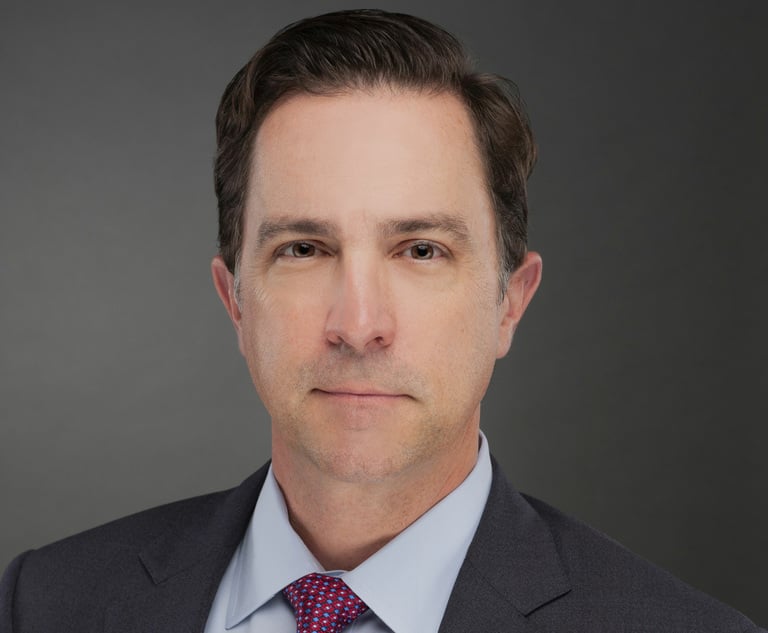As Clients Toughen Payment Terms, Texas Firms Continue to Collect
Industrywide, collections have slowed in the first half of 2019, but some regions including Texas have seen the opposite.
September 03, 2019 at 11:48 AM
5 minute read
 (Photo: Dtitstudio/Shutterstock.com)
(Photo: Dtitstudio/Shutterstock.com)
Clients have lately taken more of a heavy-handed approach to minimizing legal costs, contributing to a longer collections cycle that developed during the first six months of this year, but some regions including Texas may be bucking that trend.
Citi Private Bank Law Firm Group noted the slowdown in collections industrywide in its report on the first half of 2019. The trend goes beyond clients delaying payment because of a question about a line item on a bill.
"Some firms talk of their clients unilaterally changing payment terms as a primary driver of the longer collection cycle," Citi advisers recently wrote in their first-half report. The report noted that e-billing systems and "greater scrutiny" overall on invoices has led to less money coming in during the first half of 2019.
Marcie Borgal Shunk, president and founder of The Tilt Institute, said it's true that legal departments seem to have been tougher lately in managing outside counsel billing by looking hard at bills to ensure that firms are following their guidelines.
"Unfortunately, there are law firms that don't do a very good job of managing it. Each client has a unique set of guidelines," Shunk said.
As to the Citi suggestion that clients are changing payment terms, Shunk said that may be a further step as clients become more proactive managers of their outside counsel and legal spend.
"They have the buying power," she said.
Companies typically revise or revisit their outside counsel guidelines on a yearly basis, which may lead to new obligations and rules for outside counsel, she said.
According to the Citi report, which was based on survey responses from 161 firms around the country, the collection cycle lengthened by 1.6 percent for the industry as a whole during the first six months of 2019. In Texas, by contrast, the cycle shortened by 3.8% at the 11 Texas firms in the survey. Pennsylvania law firms also saw the collections cycle shorten slightly, by 0.8%.
Collections: Bigger in Texas
Leaders of two Texas firms reported that they are not seeing any slowdown in collections.
"We haven't really seen any pressure on payments at all," said Mark Sloan, managing partner of Thompson & Knight, which is based in Dallas.
Lee Kaplan, a founding partner of litigation boutique Smyser Kaplan & Veselka of Houston, said his firm has been extremely busy this year, and collections are on the same pace as last year or even ahead of 2018.
He said he has not noticed any situation lately involving a client wanting to change payment terms. He does recall, however, that during the Great Recession, some clients moved to a 90-day pay cycle.
Kaplan also recalled one extraordinary instance around late 2017, when a client was having financial difficulties and said that, if the law firm didn't reduce each lawyer's billing rate by 25%, it would take its files elsewhere. Kaplan said the firm's response was to continue to work for the client, but only because it was a limited discrete matter that did not materially result in a financial hit.
"That's pretty unusual," he said of that situation.
In general, according to Kaplan, institutional clients agree to pay at around 60 days—some later, some earlier—and the firm generally knows what it's getting into when it begins a representation.
Kaplan said most clients fulfill their side of the bargain, except when there might be a question on an bill that delays payment, or when a client "gets in a pickle" and asks for some relief.
Growing Pain?
Lisa Smith, a consultant at Fairfax Associates in Washington, D.C., said questions on electronic bills can indeed lead to payment delays. That's not a new trend, but it happens, Smith said.
"One good practice is to make sure the submission on electronic billing is accurate the first time. Firms have found, if they spend more time on the front end, it gets into the payment system faster," she said, noting that another best practice is to move collections out of the hands of the responsible partner to the firm's collections experts.
Smith said that, while some clients do take advantage of their firms, sometimes firms are just not that aggressive in collecting money.
Shunk said slower pay is perhaps less of a trend than a growing pain, as law firms adapt to changing norms within legal departments looking to streamline.
"As more clients bring in professionals and put attention to these details, law firms will adjust, and as they adjust [collection cycles] will go back down," she said.
Read More
Citi Survey: Homegrown Texas Firms Outperform Industry in Key Areas
Law Firm Margins Tighten as First-Half Expenses Outgrow Revenue
This content has been archived. It is available through our partners, LexisNexis® and Bloomberg Law.
To view this content, please continue to their sites.
Not a Lexis Subscriber?
Subscribe Now
Not a Bloomberg Law Subscriber?
Subscribe Now
NOT FOR REPRINT
© 2025 ALM Global, LLC, All Rights Reserved. Request academic re-use from www.copyright.com. All other uses, submit a request to [email protected]. For more information visit Asset & Logo Licensing.
You Might Like
View All
JCPenney Seeks Return of More Than $1.1M From Jackson Walker For Bankruptcy Work
3 minute read
Ex-Appellate Court Judges Launch Boutique Focused on Plaintiffs Appeals
2 minute read
O'Melveny, White & Case, Skadden Beef Up in Texas With Energy, Real Estate Lateral Partner Hires
5 minute read
Chamberlain Hrdlicka Taps a New Leader as Firm Follows Succession Planning Path
3 minute readTrending Stories
- 1Hogan Lovells Hires White & Case Corporate and Finance Team in Italy
- 2New York District Attorneys Endorse Governor's Proposed Rollback of Discovery Reforms
- 3Greenberg Traurig Launches Munich Office with Eight Hires, Including McDermott Group
- 4Midlevel Appellate Court Reinstates New York's Voting Rights Act
- 5Consumer Protection Suit Cleared to Go Forward Against Irritating Eye Serum
Who Got The Work
J. Brugh Lower of Gibbons has entered an appearance for industrial equipment supplier Devco Corporation in a pending trademark infringement lawsuit. The suit, accusing the defendant of selling knock-off Graco products, was filed Dec. 18 in New Jersey District Court by Rivkin Radler on behalf of Graco Inc. and Graco Minnesota. The case, assigned to U.S. District Judge Zahid N. Quraishi, is 3:24-cv-11294, Graco Inc. et al v. Devco Corporation.
Who Got The Work
Rebecca Maller-Stein and Kent A. Yalowitz of Arnold & Porter Kaye Scholer have entered their appearances for Hanaco Venture Capital and its executives, Lior Prosor and David Frankel, in a pending securities lawsuit. The action, filed on Dec. 24 in New York Southern District Court by Zell, Aron & Co. on behalf of Goldeneye Advisors, accuses the defendants of negligently and fraudulently managing the plaintiff's $1 million investment. The case, assigned to U.S. District Judge Vernon S. Broderick, is 1:24-cv-09918, Goldeneye Advisors, LLC v. Hanaco Venture Capital, Ltd. et al.
Who Got The Work
Attorneys from A&O Shearman has stepped in as defense counsel for Toronto-Dominion Bank and other defendants in a pending securities class action. The suit, filed Dec. 11 in New York Southern District Court by Bleichmar Fonti & Auld, accuses the defendants of concealing the bank's 'pervasive' deficiencies in regards to its compliance with the Bank Secrecy Act and the quality of its anti-money laundering controls. The case, assigned to U.S. District Judge Arun Subramanian, is 1:24-cv-09445, Gonzalez v. The Toronto-Dominion Bank et al.
Who Got The Work
Crown Castle International, a Pennsylvania company providing shared communications infrastructure, has turned to Luke D. Wolf of Gordon Rees Scully Mansukhani to fend off a pending breach-of-contract lawsuit. The court action, filed Nov. 25 in Michigan Eastern District Court by Hooper Hathaway PC on behalf of The Town Residences LLC, accuses Crown Castle of failing to transfer approximately $30,000 in utility payments from T-Mobile in breach of a roof-top lease and assignment agreement. The case, assigned to U.S. District Judge Susan K. Declercq, is 2:24-cv-13131, The Town Residences LLC v. T-Mobile US, Inc. et al.
Who Got The Work
Wilfred P. Coronato and Daniel M. Schwartz of McCarter & English have stepped in as defense counsel to Electrolux Home Products Inc. in a pending product liability lawsuit. The court action, filed Nov. 26 in New York Eastern District Court by Poulos Lopiccolo PC and Nagel Rice LLP on behalf of David Stern, alleges that the defendant's refrigerators’ drawers and shelving repeatedly break and fall apart within months after purchase. The case, assigned to U.S. District Judge Joan M. Azrack, is 2:24-cv-08204, Stern v. Electrolux Home Products, Inc.
Featured Firms
Law Offices of Gary Martin Hays & Associates, P.C.
(470) 294-1674
Law Offices of Mark E. Salomone
(857) 444-6468
Smith & Hassler
(713) 739-1250






